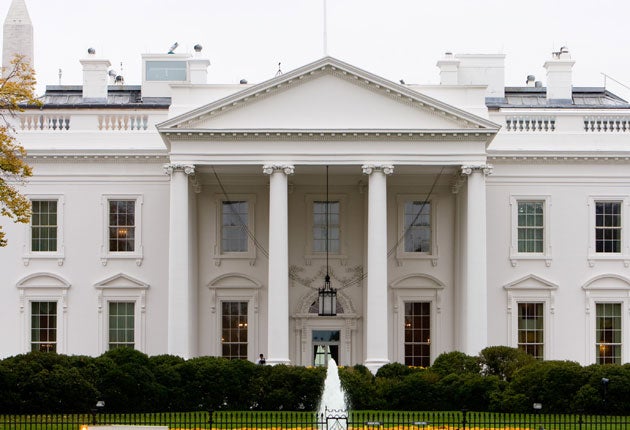Your support helps us to tell the story
From reproductive rights to climate change to Big Tech, The Independent is on the ground when the story is developing. Whether it's investigating the financials of Elon Musk's pro-Trump PAC or producing our latest documentary, 'The A Word', which shines a light on the American women fighting for reproductive rights, we know how important it is to parse out the facts from the messaging.
At such a critical moment in US history, we need reporters on the ground. Your donation allows us to keep sending journalists to speak to both sides of the story.
The Independent is trusted by Americans across the entire political spectrum. And unlike many other quality news outlets, we choose not to lock Americans out of our reporting and analysis with paywalls. We believe quality journalism should be available to everyone, paid for by those who can afford it.
Your support makes all the difference.New president Barack Obama went straight to work today appointing his new government and studying some of the problems he will inherit when he takes office in 10 weeks.
As president-elect, Mr Obama began receiving highly classified briefings from top intelligence officials today.
Mr Obama got a quick start with the transition yesterday, calling on Rahm Emanuel, a fellow Illinois politician, to serve as White House chief of staff.
With hundreds of jobs to fill before his 20 January inauguration, Mr Obama and his transition team confronted a formidable task complicated by his anti-lobbyist campaign rhetoric.
The official campaign website said no political appointees would be permitted to work on "regulations or contracts directly and substantially related to their prior employer for two years. And no political appointee will be able to lobby the executive branch after leaving government service during the remainder of the administration."
Because they often have prior experience in government or politics, lobbyists have routinely filled out the list of potential appointees for past presidents of both parties.
In offering the post of White House chief of staff to Mr Emanuel, Mr Obama turned to a fellow Chicago politician with a far different style from his own, a man known for his bluntness as well as his single-minded determination.
Mr Emanuel was a political and policy aide in Bill Clinton's White House. Leaving that, he turned to investment banking, then won a Chicago-area House seat six years ago. In Congress, he moved quickly into the Democratic leadership. As chairman of the Democratic campaign committee in 2006, he played an instrumental role in restoring his party to power after 12 years in the minority.
He stayed neutral during the long primary battle between Mr Obama and Hillary Clinton, not surprising given his long-standing ties to the former first lady and his Illinois connections with Mr Obama.
The day after the election there already was jockeying for Cabinet appointments.
Several Democrats said former presidential contender John Kerry was angling for secretary of state.
In light of the financial crisis, Mr Obama is expected to quickly name members of his economic team. Former Treasury Secretary Lawrence Summers, who served in the Clinton administration, and Timothy Geithner, president of the New York Federal Reserve Bank, are among the names being mentioned for Treasury secretary.
Treasury Secretary Henry Paulson has pledged to work with Mr Obama to ensure a smooth transition. He has already set up desks and phone lines at the department where Mr Obama's incoming Treasury team can work between now and the inauguration.
Mr Obama's transition team is headed by John Podesta, who served as chief of staff under former President Bill Clinton; Pete Rouse, who has been Mr Obama's chief of staff in the Senate, and Valerie Jarrett, a friend of the president-elect and campaign adviser.
Several Democrats described a sprawling operation well under way. Officials had kept deliberations under wraps to avoid the appearance of overconfidence before the election.
They said the group was stocked with long-time associates of Mr Obama, as well as veterans of Clinton's White House.
Mr Obama began his first full day as president-elect by having breakfast with his daughters, the type of everyday family activity he often had to sacrifice during the nearly two-year marathon campaign.
Afterward, Mr Obama left the house, and spent an hour at a friend's apartment building, where he uses the gym. Then it was back home to clean up before heading to the office - where he held a conference call to thank campaign staff around the country.
Asked how much sleep he had on the night of his historic victory, Mr Obama told reporters: "Not as much as I'd like."
Mr Obama planned to stay in Chicago through the week, with a quiet weekend at home. He was still trying to work out arrangements regarding his grandmother, who died on Sunday. A trip to Hawaii for the small private memorial she requested was likely by the end of the year.
In addition to the many decisions he faces in getting the Obama administration up and running, he has personal decisions to make, too. Such as when to move his family to Washington and where his 10- and 7-year-old daughters will go to school.
Defeated Republican candidate John McCain began discussing with senior aides what role he will play in the Senate now that he has promised to work with Mr Obama in his concession speech.
One obvious focus will be the war in Iraq. After two years spent more on the campaign than in the Senate, Mr McCain will return as the ranking Republican on the Armed Services Committee. That will put the four-term Arizona senator in a position to influence Mr Obama's plan to set a 16-month timeline to withdraw US troops from combat in Iraq.

Join our commenting forum
Join thought-provoking conversations, follow other Independent readers and see their replies
Comments